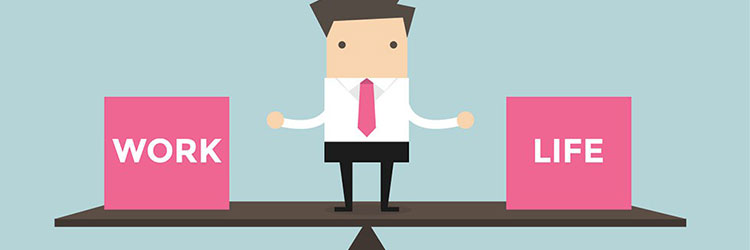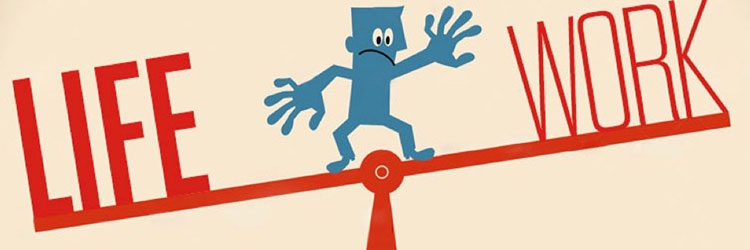Further education can be one of the most exciting times of your life. Taking on independent study, living away from home for the first time and meeting new friends from all over the world are all great reasons to take the next step in your education. There’s so much on offer that it can become daunting trying to achieve an ideal work life balance with everything you take on.
All courses bring with them a great amount of independent study, coursework and examinations, and this is before you invest time into nurturing your social relationships and networking with people on other courses. Many people also take up a job during study time, adding contracted employment to the list of things you have to juggle.
Striking a balance between your work and study life can be tough, so we spoke to life coaches Rasheed Ogunlaru and James Bargeron on what to keep in mind when prioritising your work, your study and your social life.
Work Life balance- Reflect on Your Priorities
Right from the start, you need be mindful of your capabilities as well as your availability and priorities. Focus on what you want to achieve from your time in further education and take control. Don’t be afraid to make changes if you feel they’ll help you achieve what you want. Talking to your friends about their workload and activities can help, though don’t get too hung up if their work/social balance is different to yours. Everyone works differently and prefers their own amount of group activity or time alone to reflect and recharge.
“The life you seek has a lot to do with the company that you keep – build up your relationships with those people with a positive mind-set and who are encouraging to you. Let go of those who aren’t, have an unhealthy attitude and aren’t going places.” – Rasheed
Also be aware of how you work best. For some, an early morning start gets them focussed and out of the blocks early, but you may work best during the evening after contemplating what you’ve learnt earlier. Do you work best generating your own ideas, or do you thrive bouncing them off others in a group brainstorm? Do you need to start scheduling time in a diary towards specific tasks, or can you manage several projects at once, working only when something finally ‘clicks’? Knowing how best you work and being mindful of approaching deadlines all prevents you from feeling the need to cram in a library and pull all-nighters in order to get work completed.
Know Varieties of Work life balance
Many students take on a job and keeping some stable income while studying can have many benefits, helping with living expenses or enhancing your CV. To find the type of work that is right for you, Rasheed explains the variety of work you can undertake:
Full time – usually an 8 hour day between 9am and 6pm.
Part time – there’s lots of versions of this including half days, working 3 or 4 days a week and covering full time employees when on leave.
Evening work – part time work specifically starting in the evening just as it sounds.
Saturday/weekend jobs – full day shifts, though only at weekends.
Seasonal work – for example jobs over the summer or Christmas.
Flexible working – where employers allow you to do an agreed number of hours but with flexibility on what hours in the day and often where you’re based. Some jobs may allow a blend of working on site and at home.
Consider your lecture and seminar time, your independent study and your social commitments and see where you may have the possibility of taking on employment. You should also think about the kind of work you’re best at, such as clerical, administrative or technical work. Are you best with structured work or more autonomy? Do you work best independently, or in a small team? And once you start working, Rasheed advises you to:
- Be prompt, polite and professional
- Be smart and look the part
- Take time to know the place, people and processes
- Be interested, interesting and involved
- Listen, learn, smile, be approachable, take pride and enjoy it.
Invest Time in Yourself
Work is important, but even more so is taking care of your own health. Devoting some time to your own well-being should be an integral part of your plans, whether it is a moment of reflection or indulging in a hobby. To save you from becoming a workaholic, James lays out five tips to help you find peace of mind.
“Chronic stress is the major factor which affects many students, business owners and executives, even though they may not be aware of it until it’s too late. Having a healthy work life balance, whether it’s at college or at the top of commerce, is still vital for your quality of life.” – James
- Make sure you have ‘you time’. This is time you dedicate to yourself and your own agenda. Whether it is a hobby, reading, music, learning a new language or chilling out with a movie, this time is for you to do things that help you relax for longer periods. This isn’t for stressful activities (with the exception of sports) as the idea is to reward yourself and do the things you love doing which helps build a healthier lifestyle.
- Reduce your sugar intake (and drink more water) and cut down on fizzy drinks. Especially diet drinks as most of them contain chemical sweeteners which have been shown to affect the brain and concentration. A tall glass of orange juice has almost as much sugar as a can of coke.
- Take breaks. It has been shown that short breaks, even just 5 minutes, can help break up the pattern and damage of stress. A short burst of your favourite music, a stroll to your next class, or a few minutes meditation in the library is a great way to refresh yourself. If you think meditation is wacky, keep in mind that the NFL’s Seattle Seahawks used it as a way to improve and win the Superbowl just last year!
- Start a journal. Writing helps relax the mind and allows us to develop new thoughts about challenges, possibilities and dreams. Without these we can get stuck in a negative routine or rut which becomes part of our way of thinking. Keeping a success journal of a project or your development will also help when you read it now and again to see how you are progressing rather than a stream of negative entries.
- Up your exercise. Even a small amount, such as walking, yoga, Pilates, tai chi or more rigorous forms like running, swimming, etc. Any exercise will help relieve stress and improve mental and physical health.
Work life balance- Learn From Others Experiences
To get the best insight into maintaining a balance between work, study and your social life, we chatted with Alice Megan, who worked all through her four years at Sheffield Hallam. While earning a BA (Hons) in Early Childhood Studies and then MA in Developmental Psychology she worked seasonal and longer term contracts at retail stores, along with a Saturday job at her local football ground. She even completed supply teaching work during her MA year showing she’s finely tuned to balance multiple commitments during her studies.
“I was fine all the way through my undergraduate years until the last six months while completing my dissertation. Work life balance had become more demanding over what hours I completed and as I’d saved a good amount of money and was coming to the end of my university course, I quit the retail job. It was difficult, but I managed. During my Masters I didn’t struggle as supply work was determined by my own availability so I was able to take a month off during the exam period.” – Alice
Working while at college keeps a constant employment history on your CV, and shows employers that you’re capable of managing multiple commitments. It develops your organisational skills and, if you’re working in the same field as your course, can often kick-start networking with individuals who you keep in contact with past graduation and increase your employment chances elsewhere. Above all else, you need to be able to complete your studies outside of work shifts:
“While money is nice, always keep in mind your end goal. It really isn’t worth the extra hours in work if it has a negative effect on your studies. I’d also recommend that once you get your semester timetable and any work rotas you should make a weekly schedule to ensure you don’t fall behind with anything.” -Alice
The time you spend at college will be one of the most rewarding of your work life balance
So long as you keep everything you do in balance. Paid employment can help open doors, but the experience won’t help if you can’t complete your coursework. Each student works differently, so assess how best you work and what your priorities are when planning out what you’re doing. Be confident, passionate, and allow yourself some down-time to relax and you’ll be graduating before you know it.







